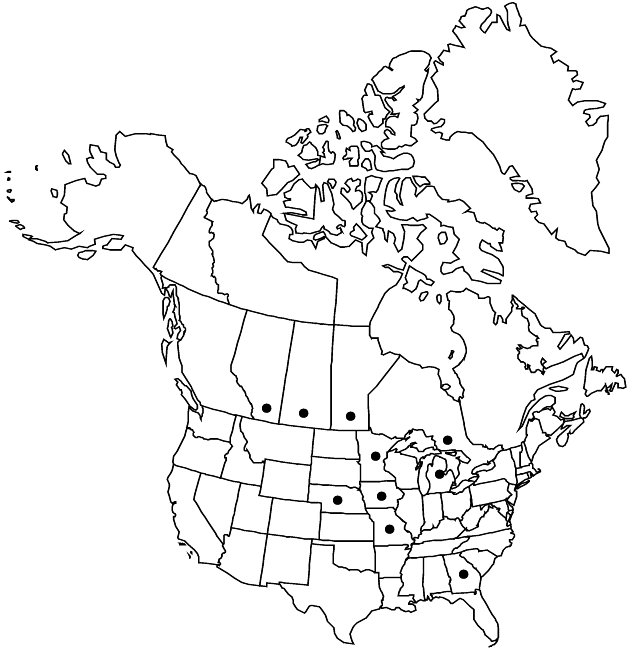Difference between revisions of "Symphyotrichum firmum"
Phytologia 77: 282. 1995.
FNA>Volume Importer |
imported>Volume Importer |
||
| (One intermediate revision by the same user not shown) | |||
| Line 8: | Line 8: | ||
}} | }} | ||
|common_names=Glossy-leaved aster | |common_names=Glossy-leaved aster | ||
| + | |special_status={{Treatment/ID/Special_status | ||
| + | |code=E | ||
| + | |label=Endemic | ||
| + | }} | ||
|basionyms={{Treatment/ID/Basionym | |basionyms={{Treatment/ID/Basionym | ||
|name=Aster firmus | |name=Aster firmus | ||
| Line 63: | Line 67: | ||
|publication title=Phytologia | |publication title=Phytologia | ||
|publication year=1995 | |publication year=1995 | ||
| − | |special status= | + | |special status=Endemic |
| − | |source xml=https:// | + | |source xml=https://bitbucket.org/aafc-mbb/fna-data-curation/src/2e0870ddd59836b60bcf96646a41e87ea5a5943a/coarse_grained_fna_xml/V19-20-21/V20_1169.xml |
|tribe=Asteraceae tribe Astereae | |tribe=Asteraceae tribe Astereae | ||
|genus=Symphyotrichum | |genus=Symphyotrichum | ||
Latest revision as of 19:59, 5 November 2020
Perennials, 40–250 cm, colonial; long-rhizomatous. Stems 1, erect (straight, ± thin, 2–8 mm diam at base, ± ribbed, red above each node), glabrous or glabrate (very sparsely hispidulous) proximally to ± hispidulous distally. Leaves (crowded, light green, shiny) firm, margins crenulate-serrate or entire, revolute, apices acute to acuminate, mucronate, abaxial faces glabrous or midveins sometimes with hairs apically, adaxial glabrous; basal withering by flowering, subpetiolate (petioles dilated, winged, sheathing), blades spatulate to oblanceolate, 30–100+ × 3–20+ mm, bases attenuate to cuneate, margins remotely crenate-serrate to subentire, apices acute to rounded; proximal cauline withering by flowering, sessile or subpetiolate (petioles widely winged, clasping), blades oblanceolate, 50–150 × 20–30 mm, greatly reduced distally, bases auriculate, clasping, apices acute to acuminate; distal sessile, blades lanceolate to lance-elliptic to oblanceolate, 40–70 × 10–25 mm, little reduced distally, bases auriculate, clasping, margins entire, apices acute to acuminate. Heads in densely paniculiform arrays, branches ascending, densely leafy (branch leaves often overtopping heads). Peduncles 0.2–3+ cm, glabrous or pilose in lines, bracts 4–6, lanceolate-linear, often subtending heads. Involucres campanulate, 6–12 mm. Phyllaries in 4–5(–6) series, linear-lanceolate to linear, slightly unequal, bases indurate 1/5–1/2, margins not scarious (outer) to narrowly scarious, erose, hyaline, sparsely ciliolate, green zones linear-lanceolate, outer sometimes ± foliaceous, apices acute to acuminate or long-acuminate to caudate, faces glabrous. Ray florets 20–40; corollas usually blue to pale lavender, sometimes white, laminae 9–18 × 1.0–1.2 mm. Disc florets 30–50; corollas yellow or cream becoming pink or purple, (4.5–)5–6.4 mm, tubes shorter than funnelform throats, lobes triangular to lanceolate, 0.6–0.9 mm. Cypselae purple or brown, obovoid, oblong or oblanceolate, ± falcate, ± compressed, 1.5–3 mm, 3–4-nerved, faces glabrous or sparsely strigillose; pappi white, 5.2–8 mm. 2n = 16.
Phenology: Flowering Aug–Oct.
Habitat: Open, wet soils, spreading into mesic mineral soils, fens, marshes, wet roadsides
Elevation: 100–400 m
Distribution

Alta., Man., Ont., Sask., Ga., Iowa, Mich., Minn., Mo., Nebr.
Discussion
The range of this little known species is badly defined because some specimens attributed to it are in fact white-rayed, glabrate forms of Symphyotrichum puniceum. More work is needed to verify the status of this species.